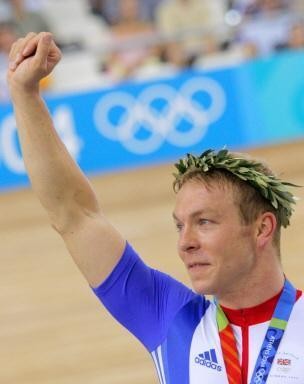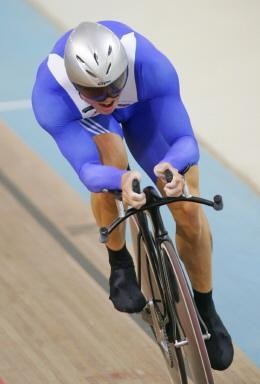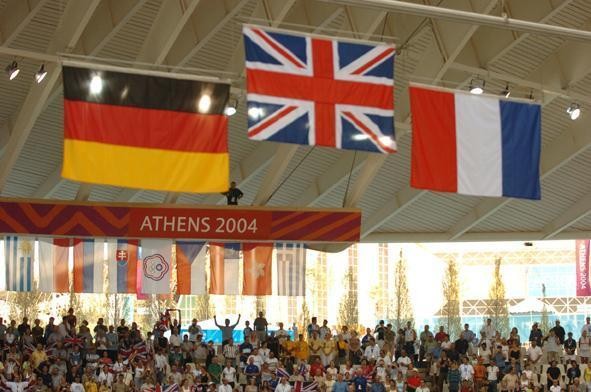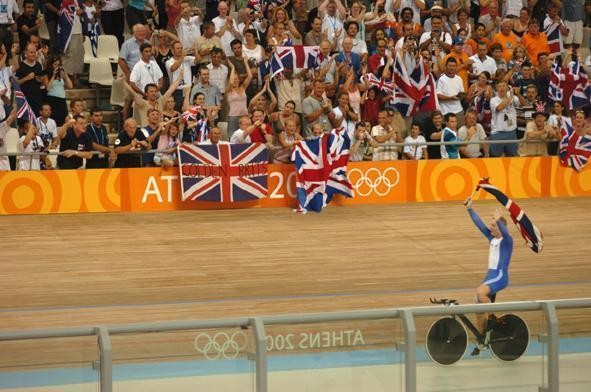Still hungry after a historic treble
Since returning from his history-making treble Athens, Kilo champion Chris Hoy has been busy with...




An interview with Chris Hoy, November 25, 2004
Since returning from his history-making treble Athens, Kilo champion Chris Hoy has been busy with appearances, dinners and functions, but recently knuckled down again and returned to racing. He's determined to keep in top shape, not to lose the edge. He's Olympic champion for the next four years, but as the amiable, ambitious Scot tells Cyclingnews' Shane Stokes, that is not enough. At just 28 years of age, many more top results are surely on the way.
In terms of excitement, suspense and drama, the Olympic Kilo contest will surely rank up there as one of the most stirring events of the year. Hollywood scriptwriters could hardly have crafted it better; first, Shane Kelly (Australia) broke the Olympic record with a time of 1:01.224. This was bettered immediately by the 1:01.186 effort of Germany's Stefan Nimke, and then superceded once again by world record holder Arnaud Tournant.
To those watching the race, it seemed that Tournant's 1:00.896 would be enough to book a place on the top step of the podium. There was just one rider to go, Great Britain's Chris Hoy, but it seemed unlikely that the new Olympic record could fall once more. Four improvements of the standard in one evening? Surely not.
Incredibly, that's what happened. Hoy shrugged off the pressure, tore out of the starting gate and blazed his way around the boards to complete the distance in just 1:00.711. The effort saw him complete a remarkable treble, adding Olympic gold to his World Championship and Commonwealth titles and further underlining Great Britain's position as one of the major forces in world track cycling.
It is to Hoy's credit that he has retained all of his hunger for success, despite reaching some of his chief goals in the sport. The thoughts of sitting back and chilling are alien to him; as long as he continues to enjoy cycling, he says that he will be pushing his limits and those of the sport.
'I am still the same person I was before, I don't think anything has changed drastically,' he tells Cyclingnews. 'I've achieved my big goals (Commonwealth, World Championship and Olympic titles) but I still feel I have a lot more to give. Throughout my career, when I achieve something, I reset my goals and move on. All I can do is attempt to reclaim my titles and then hopefully break a world record as well. That is another big target for me.'
The latest race content, interviews, features, reviews and expert buying guides, direct to your inbox!
Cyclingnews: Well done on your year, it has been some season... At this point in time, you have the Commonwealth, World Championship and Olympic titles - pretty remarkable. How does that feel?
Chris Hoy: It is a strange feeling, they are things I have always been working towards. I've met those targets now, yet I still feel I have a lot more to give. Throughout my career, when I achieve something, I reset my goals and move on. All I can do is attempt to reclaim my titles, and then hopefully break a world record as well. That is another big target for me.
CN: Obviously there was that huge amount of emotion and satisfaction, but was there also any sense of anticlimax when you have achieved those three big titles? I mean, to be chasing something for years and then to get finally there must be good, but also a little strange...
CH: I don't think there is an anticlimax from the point of view that I have nowhere to go, because I feel that you can always improve and strive for more. But, at the same time, I think a lot of athletes feel an anticlimax after the Olympic Games. It is such a massive build-up and you spend so long focusing towards one thing. In the months after Sydney there was the same feeling of anticlimax... I think it is inevitable really. But with the season starting so soon, I have not had much time to think of that. I have been so busy with other things, with appearances, dinners, and functions that I have really not had much time to have a break or even think about what is going on.
I am straight back into racing now, so I haven't even had a chance to come down yet.
CN: How has your Olympic success changed your life?
CH: I don't actually think it has. I am still the same person I was before, I don't think anything has changed drastically. I have been a lot busier than I have ever been, outside of cycling, but apart from that, I don't think it has.
I am quite glad about that as I'm quite happy with my life the way it is. I wouldn't like to suddenly be in the media spotlight all of the time, to become someone like David Beckham. You simply couldn't live your own life. So it is nice to achieve the ultimate in your sport, but still not lose your identity, your own way of life.
CN: You say that you have been very busy off the bike. What kind of things have you been doing?
CH: A variety of things, really. TV stuff, dinners, functions, appearances for my sponsors. The TV stuff that I have been doing has been quite good fun, it has been a laugh. I have been doing programmes like A Question Of Sport, and also filmed Superstars. That will be out sometime in January. I did the Blue Peter programme too. It's been a variety of things - mainly going from here to there, doing the odd dinner or appearance.
It doesn't sound like much, but it just take up so much of your time. You have got to travel to do that... If you are going up to Edinburgh, or a London, or wherever, it basically takes a day of your time.
But I really have to knuckle down now and try to get into some sort of routine, because the season has started already and I have to get back into some sort of shape. Otherwise, I will be struggling to retain my title in March...
CN: How did you get on in Superstars?
CH: I can't actually tell you how I got on as it is in the contract that we are not to say! But it was good fun. The events are not exactly conducive to cyclists doing that well, but it was really good fun just to meet all the different sportspeople from a variety of sports. You know, rugby, athletics, football, cycling, swimming - everything. They were all there.
As it was post Olympics, they tried to get as many of the Olympic athletes as was possible. So that was good. There was also a Masters' heat as well, which had all the retired sportspeople. There were some real legends, there, like Barry McGuigan, Bryan Robson, John Regis... some amazing folk that I had never met before. So that was good too.
CN: Growing up, did you have idols in sport?
CH: When I was really young, the Scottish rugby player Gavin Hastings was one of my heroes. But when it came to cycling, it was really Graeme Obree that was the first Scottish guy, on the track anyway, who was performing at the top level. When I was a junior, he was performing and I was definitely in awe of him. There were a number of people that I had a lot of respect for, but I didn't have that many heroes as such. But Graeme was one of my heroes at that time.
CN: How did you get into the sport?
CH: I have been doing cycling since I was about seven. I used to do BMX racing, I did that for seven years and then did mountain biking for a couple of years, when I turned juvenile/junior. Then I eventually got into track. I tried everything, road, time trial and then eventually got into track. Because I am the size I am, I am not going to get up any hills. Basically, you are born a sprinter, so when I found the track it was ideal for me and I just stuck at it.
CN: As a teenager, were you much bigger than other guys of the same age?
CH: I wasn't really... not until I was 18 or 19. I was big as a kid, but didn't grow until I was 18 or 19. So through my mid-teens I struggled in all my sports - rugby, rowing, cycling. I always found that I had to work harder than everybody else just to compete; the benefit of that was when I started to grow, I had the work ethic and the determination that I got from that. It carried me through.
CN: What was it that channelled you into track racing?
CH: I loved cycling, and I just found that it was the event that I was best at. I stuck at it - obviously if you do better at something, you tend to enjoy it a bit more. I did enjoy mountain biking, but I was never very good at climbing the hills... I could come down them all right, but I couldn't get back up them.
CN: What would you consider have been your key performances over the years?
CH: I think the first World [Championship] medal was a significant moment, in Berlin. I got a silver in the team sprint in 1999. That was the real eye-opener; until then, I don't think we believed that we could ever get a medal at the very highest level. And obviously the following year at the Olympics was very significant in that the team got a silver medal. But after that, my first-ever individual title was the Commonwealth Games in 2002. That was a real breakthrough for me, as was winning the world's that same year as well. Then, obviously, Athens this year.
CN: How good have you found the British system to be?
CH: Without overemphasising it really, there is no way I would be Olympic champion without the lottery-funded setup. It is not just the fact that it allows me to be full-time myself, but it also employs big staff that look after us. It definitely has been the single biggest factor in my success, to have that support, backup, coaching... it has made a huge difference.
It took a while to start working properly as the people that started it off didn't have that much experience. Basically, they have just learned over the years as we have learned too. It is starting to mature now, and hopefully we are going to start seeing the young riders come to the system and bring the next generation through for Beijing.
CN: Who are the key personnel there?
CH: The key personnel for me, this year, have been people like Shane Sutton. He is the track sprint manager and has been a breath of fresh air for all of us, basically. It is just the way he works... He works so hard for us, he lives for the sport and for the team and if he could be faulted at all it is that he doesn't switch off. He works so hard all the time that he never had a chance to relax. All the riders appreciate him, his hard work and everything he puts into it.
For me personally, I had my strength conditioning coach Dave Clark... He is not full-time employee with the plan but he is employed by the Scottish Institute of Sport and I've worked with him since Sydney 2000. The work I have done in the gym has made a big difference to my performance too.
Then you have got all the other support people - the physios, the mechanics, the coaches, the general members of staff. Iain Dyer was the track sprint coach for the past two years and he has been a big help to me, too. You know, there is just so many people who have had an input. I would say Shane has had the biggest impact on all of us, but there are numerous people have been a real help to all of us.
CN: Is the setup different within the GB system compared to other federations?
CH: I don't know really. It is hard to say. I think there is a lot of other professional teams - the Australians, the Germans, the French and ourselves. We do seem to have similar setups, and you can see that those four countries seem to be further ahead as far as the professionalism is concerned. But there are other countries... You've got Holland, and they remind me a bit of the British team four years ago, in that now they are starting to bring through some really top-class riders. They obviously don't have the same kind of financial backing as the British team did back then, but I'd say for the future, the Dutch team have got some really good riders coming through.
CN: What was your mood like out in Athens? Was it intimidating waiting for your event, or were you very focused?
CH: The closer you get, the more you realise that is the one chance you're going to have. Perhaps the only chance in your life to realise your dreams. That is the scary thing, even more so with the kilo. There are no heats, there is no qualification... you've got one minute, essentially, to either make or break, and that is what makes it so exciting, but also so nerve-wracking.
In the days before I wasn't too bad, as my confidence was quite high because my training was going well. I knew that I had trained as hard as I could and I had been injury free most of the year. I had been healthy, my form had been good, I had retained my world title, and things had gone right. So I thought, 'Well, if I go here, I am going to do the best ride I am capable of. If I end up getting beaten, at least then I will I know that I have been beaten by a better rider.'
I was happy just to go in there and do the best ride I was capable of. Still, that approach doesn't really take the pressure off you... it is all a pretty grim experience. The last few days beforehand, you really are nervous.
CN: Speaking of pressure, it must really have been building when the last few guys kept setting faster and faster times. First Shane Kelly, then Stefan Nimke, then Arnaud Tournant. What were you thinking at the time when this was all happening, when you saw them each going faster and faster?
CH: Well, I kind of learned from experience in 2003 at the world championships. I was last man off there too, but I think I just let myself get distracted by the riders before me. I was thinking too much about them. Ever since winning the world championships in Melbourne this year, I knew that I was going to be last man off in Athens. I had just been preparing myself mentally for that and the fact that there was going to be some pretty special times on the board.
I knew I would just have to think about my own ride and not worry about anybody else at all. I'd have to remind myself that it is not about them, it is about me, because there is nothing you can do to influence the other competitors. They have got their own race to do, so you can't worry about them. You have to just think about yourself. That is really all that I did, just focussing on my own ride. When I got nervous or when I got distracted, I just kept going back to thinking about my ride and visualising each stage of it, just going over it again and again. That was helping me to focus.
CN: With that tension and that dramatic buildup, it must have been some release to actually win...
CH: Yeah. The biggest emotion is actually relief, and a bit of disbelief as well. You spend so many thousands of hours training, and when you are not training, you're thinking about it. It is your lifetime's dream, your lifetime's ambition... when you finally achieve it, it takes a day or two for it to sink in and for you to believe that it has actually happened.
It is amazing, but you see so many athletes from different sports just breaking down in tears. That is an example of the release you get when, finally, you know you have done it.
The whole experience was great. My family, my friends were all there and have them with me to share at all was pretty special too.
CN: Have you noticed a greater level of recognition from people back home, since you win in Athens?
CH: It is nice, actually. If you go to the supermarket or are out in the pub having a drink, people come up and say, 'hey, I watched your race in this place or that place, following it on the television.' It is nice... people have been really positive about it and giving me a lot of support. There had an open-top bus ride through Edinburgh when I got back, plus a civic reception, and that was really good as well. A lot of people turned out for that. So, yeah, it has been really nice and there has been some really positive feedback.
CN: What then are your plans for the future? You mentioned the world record as one of your targets...
CH: First of all, I would like to retain my world title next March. After that, the Commonwealth Games in 2006 is the next big one. I'm also in the very early stages of thinking of planning a world record attempt at altitude - I have to make it a specific date, and just go up there and do it. It will have to be somewhere at a pretty high altitude. I haven't really thought about it seriously yet, but it is definitely something that I would like to have a go at. It would have to be after a major championship, when I have really good form, obviously, so it is likely that it won't be until 2006.
CN: What do you think is possible for you at altitude?
CH: It is really hard to say. I only raced at altitude once before, about four years ago, so we would have to do a bit of testing and see what is possible. But I would only attempt it if I thought it was feasible, because 58.8 is a pretty incredible time by Arnaud. I would like to give it a crack, at least, and see what is possible.
CN: It is good to hear that you still have a lot of hunger, that you haven't lost motivation after all your success...
CH: No, no, that's not a problem. I think I can keep going for as long as I enjoy it. I do enjoy the training, although it is hard work and can be monotonous. But I still enjoy it and that is the main thing. I think is the people who have to force themselves to train, who tend to pack it in or not enjoy it as much once they have achieved their goals. But I am still enjoying it and so I will keep competing as long as that is the case...
Other Talking Cycling Interviews
